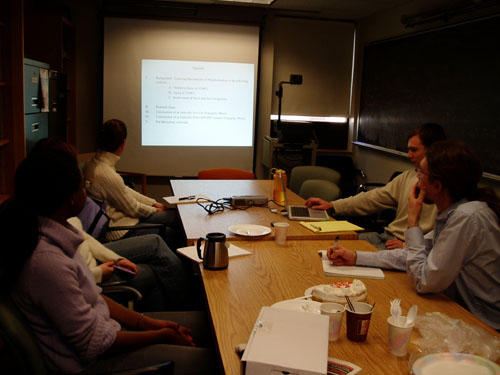Training Program in Cardiovascular Biology: Pre-Doctoral

 Cardiovascular diseases represent the major causes of mortality and morbidity in the United States, and thus require major efforts in fundamental research. The training program, supported by the National Heart Lung and Blood Institute (NHLBI), has provided a format for the training of future scientists who will devote time and efforts in developing the tools to study and control the disease. This program was initiated by Dr. Katya Ravid in 2003, inspired by Drs. Peter Brecher and the late Carl Apstein. Training is offered to graduate students in topics related to cardiovascular disease, including atherosclerosis heart failure and hypertension, with application of disciplines such as, physiology, pharmacology, biochemistry, molecular biology and genetics. The curriculum includes special courses in cardiovascular biology. Trainees participate in various activities of the Whitaker Cardiovascular Institute (CVI) at our institute. The training faculty is affiliated with basic science departments and with the CVI. There are strong research interactions between members of the training program. Each faculty has experience in teaching graduate courses, most have had numerous trainees that have gone on to hold academic positions, and all have at least one active grant from NIH. The program may be unique in that it provides an opportunity to train predoctoral fellows (PhD students and MD/PhD students) in translational and basic cardiovascular research in an academic setting where sensitivity to the need of graduate students is provided by an academic mentor approach. Importantly, students have been exposed to health equity research in the context of cardiovascular biology, with emphasis on equitable training: 50% of our trainees are women, and over 20% of all trainees are of minority populations.
Cardiovascular diseases represent the major causes of mortality and morbidity in the United States, and thus require major efforts in fundamental research. The training program, supported by the National Heart Lung and Blood Institute (NHLBI), has provided a format for the training of future scientists who will devote time and efforts in developing the tools to study and control the disease. This program was initiated by Dr. Katya Ravid in 2003, inspired by Drs. Peter Brecher and the late Carl Apstein. Training is offered to graduate students in topics related to cardiovascular disease, including atherosclerosis heart failure and hypertension, with application of disciplines such as, physiology, pharmacology, biochemistry, molecular biology and genetics. The curriculum includes special courses in cardiovascular biology. Trainees participate in various activities of the Whitaker Cardiovascular Institute (CVI) at our institute. The training faculty is affiliated with basic science departments and with the CVI. There are strong research interactions between members of the training program. Each faculty has experience in teaching graduate courses, most have had numerous trainees that have gone on to hold academic positions, and all have at least one active grant from NIH. The program may be unique in that it provides an opportunity to train predoctoral fellows (PhD students and MD/PhD students) in translational and basic cardiovascular research in an academic setting where sensitivity to the need of graduate students is provided by an academic mentor approach. Importantly, students have been exposed to health equity research in the context of cardiovascular biology, with emphasis on equitable training: 50% of our trainees are women, and over 20% of all trainees are of minority populations.
A Journal Club by trainees in the Cardiovascular Training Program
